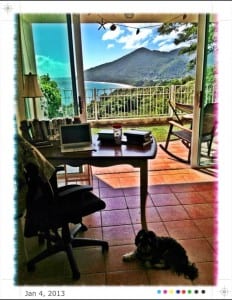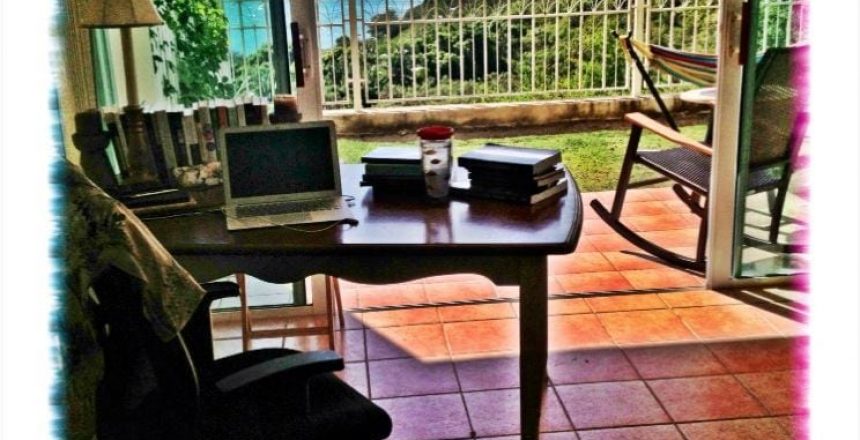 I went to a popular restaurant high up in the hills with a tremendous view of the Sea on Saturday night to be around people and watch the sunset. As I was sitting there alone, perched at the bar of the outdoor patio, watching the people around me, I was happy. Joyful even. How incredible is my life?! But what I also felt was something very foreign to me in my life, but not on this island. I felt really uncomfortable. With a move from Uptown Dallas to Rural Puerto Rico, the life I am experiencing and the lessons I am learning are much different than what I expected.
I went to a popular restaurant high up in the hills with a tremendous view of the Sea on Saturday night to be around people and watch the sunset. As I was sitting there alone, perched at the bar of the outdoor patio, watching the people around me, I was happy. Joyful even. How incredible is my life?! But what I also felt was something very foreign to me in my life, but not on this island. I felt really uncomfortable. With a move from Uptown Dallas to Rural Puerto Rico, the life I am experiencing and the lessons I am learning are much different than what I expected.
- I expected to connect with the nature of a Caribbean island.
- I anticipated peace and tranquility to write my dissertation.
- I hoped for personal renewal and soulful regeneration.
In the four months today that I have been in Maunabo, Puerto Rico, I have easily acquired each of these things, and for this, I am so richly blessed. However, no matter how comfortable I am sitting here at my desk overlooking the Caribbean sea, what I did not expect is how uncomfortable I would be when I leave the home I have made for myself here.
Maunabo is a small Puerto Rican community of less than 15K people, with a per capita income of $5400. I am not sure what the industry is here, as no one seems to know. Most of the Puerto Rican’s here consider themselves Negros with more Taino and African descent, as opposed to the Blancos of the north of the island with more Spanish descent. There are a few American expats who have retired here in this sleepy pueblo, and a few Americans who own condos in this complex where I rent that infrequently visit.
There are NOT, however, any other 30 year old white Americans living full-time here in Maunabo. Add in that I am self-employed, I just bought a shiny Jeep Wrangler, I have pretty nice clothes, and I currently live in the only fortressed (ok gated) community for miles. And finally, let’s factor in how bizarre it is in this machismo culture for a 30 year old woman to be single, without children, and living independently (and quite richly by the local standard) very far away from my family. Point is: I stick out like a sore thumb, and I am finding myself frequently uncomfortable.
As I look back on my life, I have, for the most part, been very comfortable in my environments. There have always been others like me that I could flock to, and associate with, not because I am racist, classist, or feminist, but because we tend to as humans associate naturally with what is comfortable, and we are most often comfortable with people that are not much different than ourselves. Even when I lived in Spain, I wasn’t this uncomfortable, because I was in a large metropolitan area where I somehow found others like me to befriend. At rare times, part of me wants to run as fast as I can back to Uptown, where there are people who look like, live like, and think like me. But most of the time, despite the discomfort, I just want to figure this place out.
My dissertation is using intersectional feminist theory to examine high school female’s experiences in engineering. This theory looks at race, gender, and class as influencers of our life experiences. As a female engineer, I was certainly in the minority in my education and when I practiced, but throughout my life I have been in the majority as a white middle class citizen. Until now. I am seeing life from the other side, the side of the minority, but it is the combination of my race, class and gender in this environment that I am finding to be the most fascinating. This intersection frames much of the human experience and is integral to individuals positions in the social world. I am looked at and treated differently in the pueblo because I am white, female, and considered wealthy. While the treatment is not detrimental by any means, it isn’t always always what I desire.
I’ve been here for four months, and I plan to stay at least until the summer of 2014. I imagine that I will still be uncomfortable until the time comes for me to leave (if I ever do!), but I expect that the discomfort will wane as I will adapt strategies to help me better fit in. Now, to think about the students from my dissertation research, my classmates at Purdue, or the students in your classroom. How are they uncomfortable? How can we as educators help bridge the gaps of race, gender, and class in our teaching environments? As an educator, I don’t want my students to ever have to change or adapt to fit-in to my classroom. I want to celebrate individuality and create an environment that truly welcomes diversity of all shapes and sizes. I believe that is our responsibilty as educators to create safe enviroments for our students. How do we do this? What are your strategies?
[quote]The best things happen at the exit ramp from your comfort zone. – Karen Salmanson[/quote]
As for me now, being uncomfortable will make me a stronger and more open-minded person. I will learn about race, class, and gender in a whole new way, that I would likely never experience without exiting from my comfort zone. I want to revel in this discomfort, like my dog Dodi likes to roll around in the grass; I want dive in and make the most of this time. This classroom I find myself in requires courage, bravery, and determination, but I believe will yield priceless experiences and absolute adventure that will hopefully make me a better educator. My hope, however, is that we may create classrooms that do not require courage, bravery, and determination, but instead require more productive skills such as critical thinking, creativity, and collaboration. May we bridge the gaps for our students, and all continue to engineer equity in education.



One Response
I can still distinctly remember how I felt as the only young woman in a class of 200 young men during my first few engineering classes. In high school, I was a talkative, chatty, bubbly person who often raised my hand and always participated in class. In college, I never raised my hand, for fear of looking stupid (even though I now realize that many were probably were just as confused as I was). I represented all women…and for me being a blonde, all blonde women as well. I did nothing to call attention to myself, I wanted to be invisible. I also did not want to be treated differently, or given special favors as a woman. I rarely attended office hours or asked my teachers for help, even though I needed it.
I’ve thought about this issue a lot, as “STEM” professionals often look male and white and in our technical culture we often use acronyms to shorten our technical language. This “techie speak” is also a barrier, as people new to the professions are hesitant to ask about words they don’t understand as they don’t want to appear non-technical.
Now, many years later, I’m not afraid to ask questions or ask for help or admit I don’t understand….but I still think much work as to be done to invite others into our professions, be welcoming, and realize that other viewpoints and cultures will make better teams for all.
I’m enjoying readying your journey, Meagan!